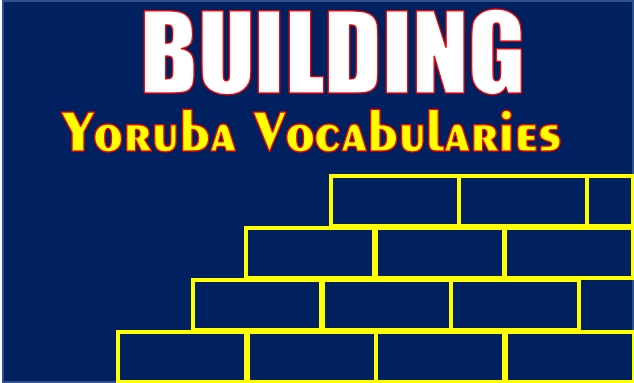
support@yorubalibrary.com
+2348073529208, 07038599574

Our last lesson was centered on Yoruba numbers and how they are being counted. Today, we shall continue in our free Yoruba lessons by learning how to build vocabularies.
Building a strong vocabulary is essential for becoming proficient in any language. In Yoruba, having a wide range of words at your disposal allows you to express yourself better, understand others more easily, and engage in more complex conversations. 
This lesson will focus on practical techniques to build and expand your Yoruba vocabulary. We will cover categories of words, techniques for remembering them, and how to use them in different contexts.
CATEGORIES OF VOCABULARIES TO LEARN
1. Everyday Words
Everyday words are daily words being incorporated in regular conversation. Start by learning words that you can use on a daily basis. These include simple nouns, verbs, adjectives, and adverbs.
Example Nouns:
Ilé (house)
Ọkọ (husband)
Obìnrin (woman)
Ẹkọ́ (education)
Example Verbs:
Ṣe (do)
Lọ (go)
Jẹ (eat)
Rìn (walk)
Example Adjectives:
Tóbi (big)
Kere (small)
Dàa (good)
Rewa (Beautiful)
2. Action Words (Verbs)
Yoruba verbs are essential for conversation. The meaning of the sentence often depends on the verb used.
Example:
Mo fẹ́ ẹ̀kọ́ (I want education)
O n lọ sí ilé (She/he is going to the house)
Àwọn ọmọ wáa (The children came)
3. Colors
Knowing the names of colors will help you describe things better.
Example Colors:
Pupa (red)
Awo Olomi Aro (Blue)
Àwọ̀ ewé (green)
Funfun (white)
Dúdú (black)
4. Numbers
Numbers are fundamental for everyday transactions, whether buying something, counting, or discussing time.
Example Numbers:
Okan (one)
Méjì (two)
Mẹta (three)
Mẹrin (four)
Márùn-ún (five)
5. Family and Relationship Terms
Building vocabulary around family and relationships will help you talk about your personal life and social interactions.
Example Family Terms:
Bàbá (father)
Màmá (mother)
Ọmọ (child)
Arákùnrin (brother)
Arábìnrin (sister)
TECHNIQUES FOR REMEMBERING VOCABULARIES
1. Flashcards
Create flashcards with the Yoruba word on one side and its English meaning on the other. Go through them regularly to test your recall. For added fun, try making a set of flashcards with pictures corresponding to the words.
2. Labeling
Label objects around your house with their Yoruba names. For example, label your door with Ilekun (door) or your chair with Àga (chair). This technique helps associate vocabulary with real-life objects.
3. Use in Sentences
Rather than learning words in isolation, try putting them into simple sentences. This helps solidify their meanings and improves context usage. For example:
a) Mo fẹ́ jẹun (I want to eat)
b) o Ilé mi rewa (My house is beautiful)
4. Listen to Yoruba Content
Watch Yoruba movies, listen to music, or podcasts. The more you hear words in context, the easier they will be to remember. Pay attention to how different words are used in different scenarios.
5. Practice with a Partner
If you have a language partner, practice using new words in a conversation. This will help reinforce the vocabulary and improve fluency. For example, if you're learning numbers, count together or talk about your day using newly learned adjectives.
PRACTICE ACTIVITY - VOCABULARY QUIZ
Identify the Yoruba words for the following:
1. Chair
2. Father
3. Big
4. Green
5. Walk
Conclusion and Homework
1. Memorize 10 new words from today's lesson.
2. Write five sentences using at least three new words.
3. Practice saying them aloud or with a language partner to improve your pronunciation.

Learn about the Yoruba concept of Ìwà Pẹ̀lẹ́ (good…

Learn special praises for Divine Being and Creator…